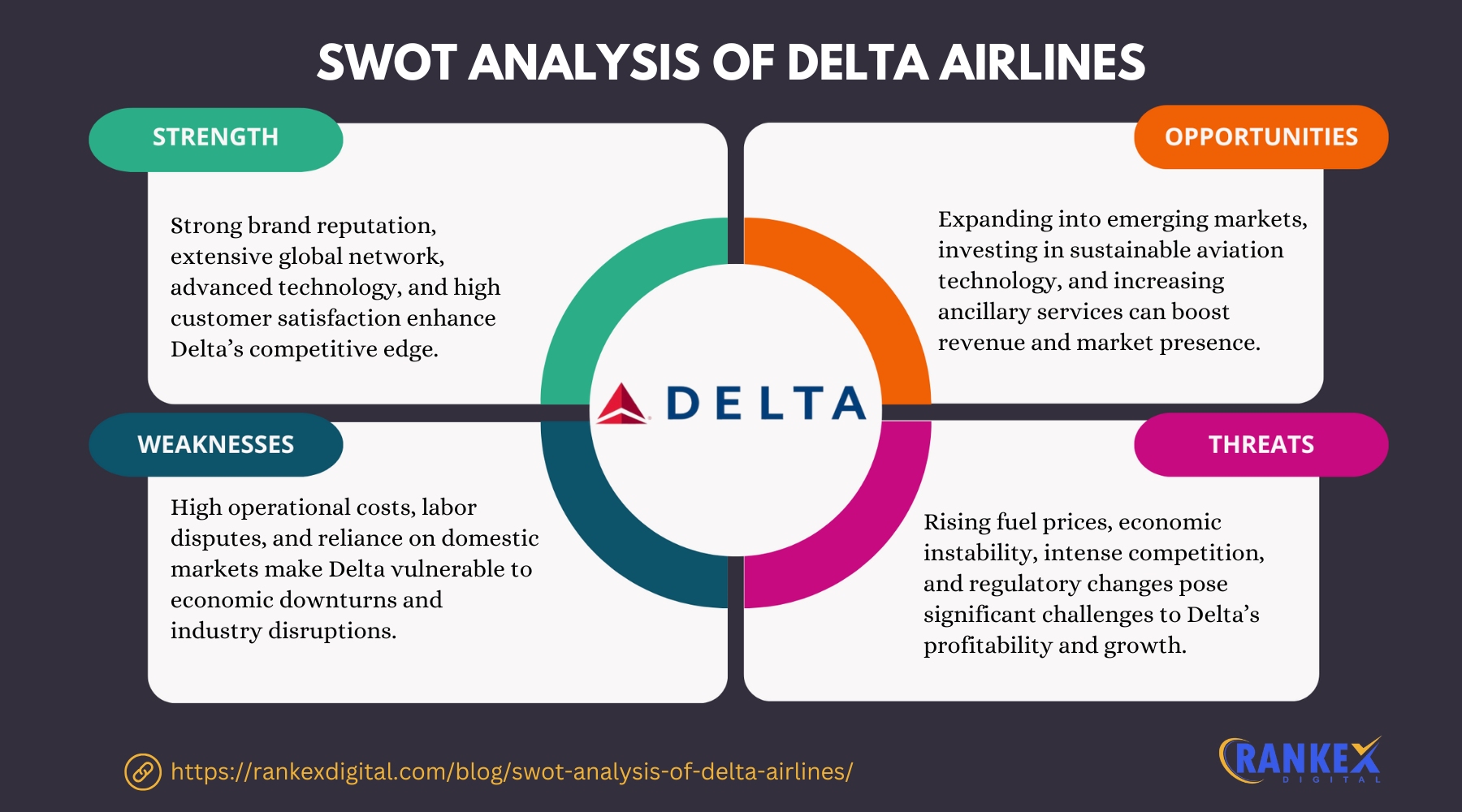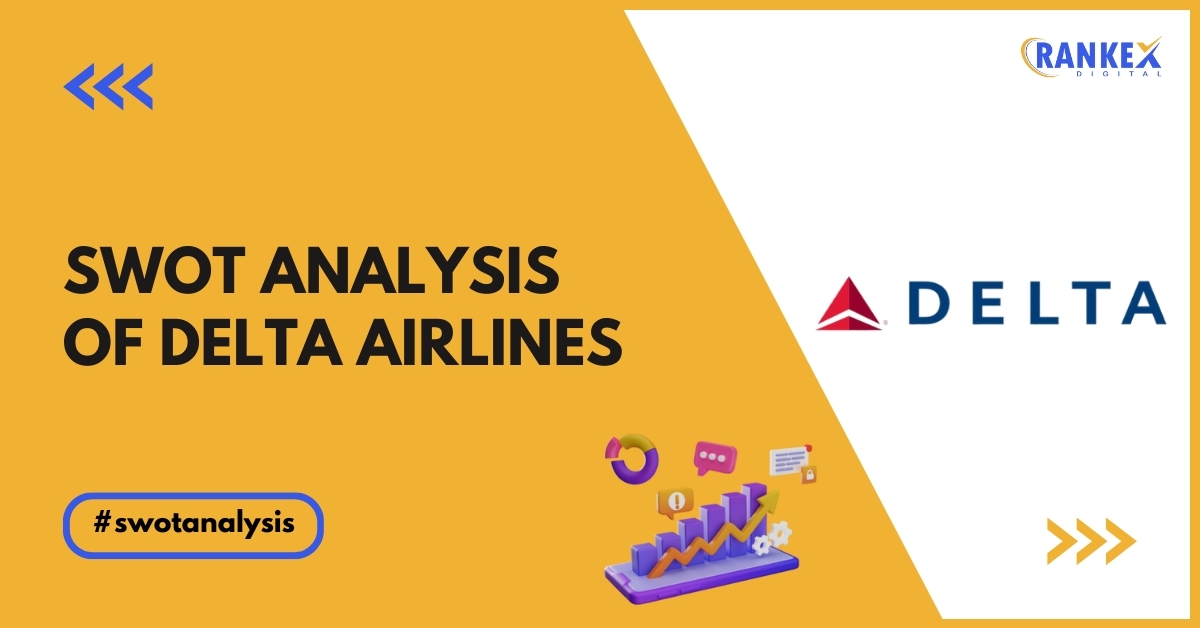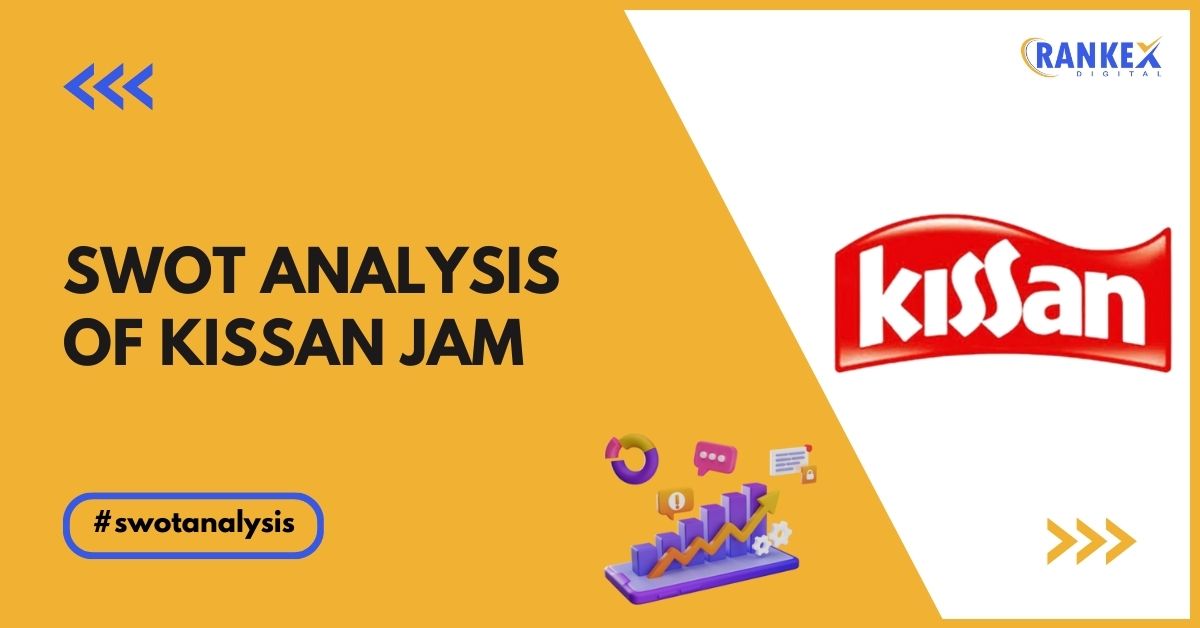Delta Airlines, one of the leading global carriers, has been a staple of the aviation industry for decades. Known for its extensive network, superior customer service, and strong presence in both domestic and international markets, Delta continues to be a dominant force in air travel.
In this blog, we conduct a comprehensive SWOT analysis of Delta Airlines, identifying its strengths, weaknesses, opportunities, and threats as the airline navigates an increasingly competitive and dynamic industry.
In this blog
Overview of Delta Airlines

Founded in 1924 and headquartered in Atlanta, Georgia, Delta Airlines is one of the largest air carriers in the world.
With a fleet that spans both domestic and international routes, Delta is known for its commitment to customer service, operational efficiency, and its widespread loyalty program, SkyMiles.
As an industry leader, Delta serves over 200 million passengers annually and maintains a strong network of destinations.
Quick Stats About Delta Airlines
| Attribute | Details |
|---|---|
| Founder | C.E. Woolman |
| Year Founded | 1924 |
| Headquarters | Atlanta, Georgia, USA |
| Employees | 91,000+ |
| CEO | Ed Bastian |
| Revenue (2023) | $59 Billion |
| Net Income (2023) | $3.5 Billion |
SWOT Analysis of Delta Airlines

Strengths of Delta Airlines
- Strong Brand Reputation: Delta has built a reputable brand known for reliability and customer satisfaction. Its consistent performance and safety record contribute to a loyal customer base and make it a top choice for both business and leisure travellers.
- Extensive Network: Delta operates a vast global network, with flights to over 300 destinations in more than 50 countries. This extensive reach gives Delta a significant competitive advantage, particularly in international travel.
- Operational Efficiency: Delta’s operational excellence, including its on-time performance, effective scheduling, and high-quality in-flight services, enables it to maintain an edge over competitors in terms of both customer satisfaction and cost management.
- SkyMiles Loyalty Program: The SkyMiles frequent flyer program is one of the strongest in the industry. It not only attracts repeat business but also increases customer engagement by offering exclusive benefits, such as upgrades and access to Delta’s Sky Clubs.
- Technological Advancements: Delta has embraced cutting-edge technology, including self-check-in kiosks, mobile apps for customer convenience, and real-time flight tracking. The airline’s use of technology enhances the customer experience and operational efficiency.
Weaknesses of Delta Airlines
- High Operating Costs: Operating a large fleet of aircraft and maintaining a global network is expensive. High fuel costs, labour expenses, and the overhead associated with running such a vast operation impact Delta’s profitability, especially during times of economic instability.
- Dependence on the U.S. Market: While Delta has an extensive international presence, a significant portion of its revenue comes from the domestic U.S. market. Any downturns in the U.S. economy or disruptions in domestic travel trends could negatively affect the airline’s performance.
- Vulnerability to External Factors: Delta, like all airlines, is highly vulnerable to external factors such as fluctuating fuel prices, weather disruptions, geopolitical tensions, and pandemics. The COVID-19 pandemic, for example, severely impacted global air travel, and similar disruptions could occur in the future.
- Labour Disputes: Delta’s size and labour force can sometimes lead to disputes or strikes. Labour issues, such as those related to pilot contracts or employee wages, have the potential to disrupt operations and damage the airline’s public image.
Opportunities for Delta Airlines
- Expansion in Emerging Markets: The global middle class is growing, especially in Asia and Latin America. These emerging markets present a significant opportunity for Delta to expand its network and tap into new customer bases seeking international travel options.
- Sustainability Initiatives: The aviation industry is under increasing pressure to reduce its carbon footprint. Delta has the opportunity to lead by investing in sustainable aviation fuel (SAF), modernizing its fleet to include more fuel-efficient aircraft, and exploring ways to reduce emissions, aligning with global sustainability goals.
- Partnerships and Alliances: Delta is a key member of the SkyTeam alliance, which allows it to offer an expanded route network through code-sharing agreements with other carriers. Strengthening these partnerships or forming new ones could further boost Delta’s market share, particularly in underserved regions.
- Technological Innovations: Advancements in aviation technology, such as electric or hybrid aircraft, could reduce operating costs and environmental impact. Delta has the chance to lead the way by investing in new technologies that could revolutionize air travel.
- Increased Demand for Premium Travel: As business and luxury travel continues to rebound, Delta has the opportunity to capitalize on the demand for premium services. By enhancing its business-class offerings and expanding its first-class amenities, Delta can appeal to high-net-worth individuals and corporate clients.
Threats to Delta Airlines
- Intense Competition: Delta faces fierce competition from legacy carriers like Air India, American Airlines and United Airlines, as well as low-cost carriers such as Southwest and Spirit. This competitive environment puts pressure on pricing strategies and customer loyalty.
- Economic Recession: Economic downturns can lead to reduced consumer spending, including travel. During recessions, both business and leisure travellers may cut back on flights, particularly premium services, impacting Delta’s revenue.
- Regulatory Challenges: The aviation industry is heavily regulated, and changes in government policies or international aviation regulations could affect Delta’s operations. This includes new environmental regulations, changes in air traffic control policies, and restrictions on international travel.
- Fuel Price Volatility: The cost of jet fuel is a significant factor in Delta’s operating expenses. Fluctuations in fuel prices, driven by geopolitical factors or supply chain disruptions, can significantly impact the airline’s bottom line.
- Security Risks and Terrorism: Security threats, including terrorism and cyberattacks, pose risks to airlines worldwide. Delta must continually invest in security measures to ensure the safety of its passengers and mitigate potential threats.
Conclusion
Delta Airlines’ SWOT analysis reveals a company that has positioned itself as a leader in the airline industry, with strong brand equity, operational excellence, and a vast global network.
However, like any business, it faces challenges such as high operating costs, competition, and vulnerabilities to external factors.
By leveraging its strengths and seizing opportunities in emerging markets and sustainability initiatives, Delta can continue to soar above its competitors, ensuring long-term growth and stability in the ever-evolving aviation landscape.
Frequently Asked Questions
What is Delta Airlines’ biggest strength in the market?
Delta’s biggest strength is its extensive network, global reach, and high customer satisfaction, backed by its strong brand reputation and reliable operations.
How does Delta manage competition in the airline industry?
Delta remains competitive by focusing on operational efficiency, maintaining a strong loyalty program (SkyMiles), and continuously enhancing its customer experience through innovation and service quality.
What sustainability efforts is Delta Airlines pursuing?
Delta is investing in sustainable aviation fuel (SAF), improving fuel efficiency in its fleet, and aiming to reduce its carbon emissions as part of its broader commitment to environmental sustainability.
How has Delta embraced technology to improve its services?
Delta has integrated advanced technologies like mobile apps, in-flight connectivity, and self-service check-in options to improve convenience and the overall travel experience for its passengers.
What are the key threats Delta Airlines faces?
Delta faces threats from intense competition, fluctuating fuel prices, economic downturns, regulatory challenges, and security risks, all of which can impact its profitability and operations.











